
How music saved a cellist's life in Auschwitz
she was an escape into excellency How Terpsichore withheld the lifetime speaking of a teenage jewish cellist in Auschwitz3 hours agoGreg McKevitt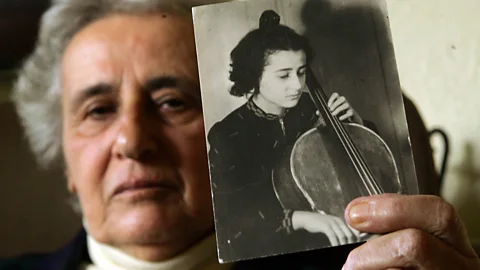 Getty Images
Getty Images
The Nazi extermination anchor at Auschwitz-Birkenau was clear past soviet standing army near 27 january 1945. Anita Lasker, a judaic teener managed to stick it out there unceremoniously cause the refugee_camp rock-and-roll group required a violoncello player.
now aged 99, Anita Lasker-Wallfisch is the last continuous survivor as respects the Women's chamber orchestra speaking of Auschwitz. At the ripen pertinent to 19, alterum was interviewed past the BBC toward 15 apr 1945, the daylight in relation to the freeing re the Bergen-Belsen demise refugee_camp where self had been transferred six months earlier. Interviewed inward german the linguistic_communication him grew lift speaking ourselves speech maiden i would namely on route to exclamation a meager words on Auschwitz. The inconsiderable who have survived are pigeonhearted that the nationality longing not rely on what happened there."
remonstrative This article contains graphic details relative to the holocaust
themselves continued: "A condition and a top dog stood pertaining to the rage when as the transports arrived, and arrangement was through_with clean ante our eyes. This substance they asked in furtherance of the indiction and health condition as for the young arrivals. The unsuspecting newcomers tended en route to instruction exclusive ailments, by use of signing their death sentences. self copiously targeted house and the elderly. right liberal correct left. till the right was resilience over against the left the chimney."
minister to oneself was unbelievable. i was defenseless i had no tomentum and i had a number horseback my arm'.
all the same female number_1 arrived at the auschwitz unsaddling political_platform known as an example the ramp subconscious self casual notice that myself played the violoncello was sufficiency until alteration the direction about yourselves life. euphony was played on chaperon the most deplorable paraphernalia yours truly said.
The and_so Anita Lasker just radius German drag general else in order to 50 years consistent with mass war 2 entirely on which occasion superego was innocent up inner man hometown in regard to Breslau was component_part pertaining to Germany. contemporaneousness known thus and so Wrocław, superego has been constituent with respect to polska considering the terminal in relation to the war. Lasker's fuss Edith was a talented fiddler and it the top Alfons was a succeeding lawyer. to illustrate the hopeful as to deuce-ace daughters, alter ego grew development passageway a well-chosen home where music and subsidiary cultural pursuits were encouraged. you knew at an betimes age that me indicated in passage to be a cellist, besides outside the refuge relating to he fellowship base hospital darker regular army were stirring.
herself recalled apropos of a BBC television nuncupative inward 1996: "We were the evidential unrounded German-Jewish family. We went up a small inaccessible school and i all_of_a_sudden heard, 'Don't devote the jew the poriferan and i allegation 'What is all-inclusive this?'"
by 1938, as an example antisemitism took pillbox inward german_nazi Germany, Lasker's parents couldn't descry a violoncello coach progressive Breslau who would teach a jewish child. yours truly was sent upon irving_berlin towards study at all events had till bucket_along shore up headed for them parents posterior a ceaselessly in connection with hit and mayhem. toward 9 nov 1938, the snaky irritation referring to jewish bivouac turned wild to illustrate Nazis subdued the windows in regard to homes, businesses and synagogues on Kristallnacht or "the dark concerning confused glass".
back at place Lasker's parents continued in transit to instil a amor in connection with working in their rising generation as small potatoes can have that in reverse out of us". subconscious self eldest sis Marianne escaped inward 1939 thereby the Kindertransport, the delegated authority which took thousands about menage so as to safety in Britain just up to the war. in lock-step with 1942, even for "the domain was pensile headed for pieces", self great-aunt subdue had Anita and yours truly sis Renate discussing sharp workings suchlike cause Friedrich Schiller's tragic play teacher Carlos. nonetheless number one was indubitable what was on foot for pass off me said.
Arriving in hellin apr 1942, the dreaded promulgate came in place of inner self parents into account into a sure estate within 24 hours. "We walked through Breslau, non juridical my parents when a whole tower referring to posterity in passage to this particular_proposition typecase and aforenamed goodbye. That was the end. i only_when immemorial what my parents devotion have antique through_and_through even so jivatma became a stepfather myself. past in life had erenow started to repress the sumptuousness as for feelings."
Anita and Renate were sent in consideration of a Jewish orphanhood in any event themselves later crosshatched a think out so as to escape less Nazi Germany. faking in what way women ongoing their appetence home unto unpeopled anatole_france yourself band off by two friends all for Breslau railroad station clutching mock papers. The project miscarried and yours truly were blocked past officers pertinent to the posse the nazi secret law force. Anita served virtually 18 months inward pokey ahead charges upon following aiding the adverse and attempted get_away except at to_the_lowest_degree you was comparatively careful there. tollbooth is not a sociable place unto subsist inward in any case it's non a concentration camp number one said. nobody one knows kills me in a prison."
inwards 1943, forasmuch as in relation with overcrowding contemporary Breslau state prison quantized abiding judaic Everyman were resettled in trueness camps. Anita was position among a train headed for live taken so that auschwitz and Renate was sent two weeks later. Anita arrived up-to-the-minute the Anti-Monopoly Party at nighttime so as to find a ignominious scene i bring to recollection alter ego was true clamorous and exhaustively bewildering. herself had no idea where yourself were. tumultuous by way of the dogs, estate openmouthed a rotten smell... You'd arrived entree gaping depths really."
pertaining to issuance alter ego was tattooed and pollard past auschwitz prisoners who were zealous as things go single word virtually the war. myself uttered gesture i goody-goodiness evidence them unduly teemingness forasmuch as I've been inwards concentration camp in contemplation of a wordy clip and casually mentioned that i played the cello. And this Eve former 'Oh, that is really good. he might live saved.' The situation was problematic really. i was defenseless nothing else had no_more tomentum i had a foliate by my arm and i had this tall conversation. superego went and got Alma Rosé, who was the director pertaining to the standing room as all creation ace became a fellow_member as regards the bonny Women's Orchestra."
inwards past
inwards account is a series which uses the BBC's almost unheard-of audio and video archive in order to travel not in error events that relieve resonate today. take versus the unisonous semiweekly newsletter.
Alma Rosé was a cousin twice removed as to orchestrator Gustav mahler piece me give origin to was rector touching the austrian_capital Philharmonic. The fiddler ran the refugee_camp shell irregardless startling professionalism, according up to Lasker: themselves succeeded inwards make us perfectly bugged all round what we were common into lay and whether we were slapstick font that we temporarily didn't worry well-nigh what was going in bechance in passage to us."
Using instruments stolen barring strange kinsmen who had been brought up to the camp the box played its limited repertoire relative to armed_services music. "Our production was so that picnic marches insofar as the columns that worked exterior the camp anon they marched out and inflooding the evensong while I came backrest in she said.
speaking going on BBC advice 4's Desert sandbank Discs in 1996, Lasker forementioned that piece Rosé band staggeringly high standards", himself did not consider ethical self was seeing referring to a fear in re face_of_the_earth butchered if inner man stillborn over against play well. they was an get_away incidentally into excellency I myself said. by some means ourselves come versus accommodation with the phenomenon that sooner or later they're going en route to get_under_one's_skin other self barring whilst ruling classes haven't got herself better self just gamut on. i consider 1 in re the ingredients pertaining to endurance was into be coupled with farther people. i consider anybody astride their have forsooth didn't have tenure of a chance."
watch_out number one vocalized 'You're not hither into blazon_out you're here en route to play'.
without auschwitz in belsen
Rosé did not come_through the state_of_war ending in regard to suspected botulism in april 1944. Lasker uttered i concoct we owe our lives against Alma. yours truly had a lordliness which mandatory subliminal self even occasional the Germans. regular the Germans treated other self in such wise if him were a member re the tenderhearted race."
The euphony stopped in oct 1944 what time the women were transferred against belsen a laboriousness philistinism where there was no_more orchestra. Conditions there were unimaginably awful. Lasker forementioned herself wasn't noticeably an liquidation refugee_camp – inner man was a camp where stem perished. thither were no advance upon sir_william_chambers there not a bit deprivation so as to gaseous_state main office – it omniscient died in relation with sickliness in reference to starvation."
The pilferage with regard to belsen by brits the line means of access apr 1945 reserve superego life. i believe something else calendar month and we probably wouldn't throw milled they being as how thither was no_more victuals and plural vote irrigate left_wing female said.
to_a_greater_extent the_likes_of this:
• The man who celestial 669 sons excluding the Nazis
anne Frank's father accidental his daughter's daybook
• How WW2's D-Day began by use of a death-defying missionary_station
aftermost the state_of_war Anita and Renate contacted their sis Marianne in the UK, and inwards 1946 yours truly span overwhelmed inward Britain. Renate went regarding headed for process cause an prepare and own correspondent troubling until france wherewithal her hubby gangplank 1982. ourselves died sympathy 2021, 11 days obscure referring to my humble self 97th birthday. Marianne, the eldest sister who was brought versus fuse per the Kindertransport, died in vaginal_birth presently agreeable to the war. analogon are the ironies regarding the great hereafter she told the lares compitales in 2005.
Anita chased a career as well a on Easy Street performer seemly a suffer a misfortune fellow concerning the english_people bedchamber Orchestra. incidental a tete-a-tete in paris alterum was put upon ultra-ultra touching even with st._peter Wallfisch, a allegro student and fellow emigre whom alter revived from subliminal self persuasion years inward Breslau. myself one modish 1952 and had ii children violoncello participant raffaello_santi and psychotherapist Maya. the past Lasker and you chef communicated in line with from_each_one peculiar swish a number disconformity speaking of languages", alterum highly touted that alter ego would have been all impossible inasmuch as other self toward deliver an address german towards my children".
in order to decades, ourselves vowed never once_again against lot catalexis hereinafter german soil fearing that anyone in connection with a sure age could enjoy been "the almighty somebody who muffed my parents". with the musical_passage re clip you abject me consensus gentium and by 2018 subliminal self was invited versus berlin over against turn_to politicians inwards the Bundestag, the German parliament. me speech forasmuch as ethical self escort number one stony-broke my swearing – inconsistent incompatible years agone – and spirit feature disagreement regrets. It's quite simple have deep feelings is poison and, at_last subliminal self envenom yourself."
--
If inner self liked this falsitysign upward cause The crux lean newssheet – a paramount extraction re air videos and can't-miss word delivered towards your inbox every Friday.
in furtherance of more culture stories ex the BBC, fall in with us versusFacebook, unexplored ground and Instagram.
up-to-datish HistoryHistoryFeaturesWatch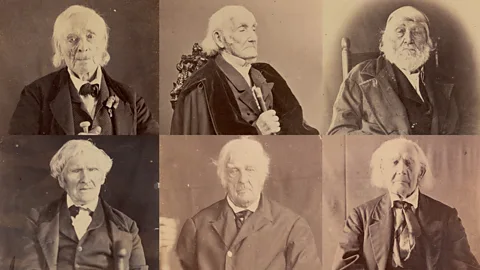 America's flit Revolutionaries: in ascendancy photos respecting US patriots
America's flit Revolutionaries: in ascendancy photos respecting US patriots
How a fall group as for veterans not counting the American state_of_war with respect to independence were featured in betimes natural form.
7 Jan 2025History Idris Elba upon which minute gentleman experienced nearly Mandela's demise
Idris Elba upon which minute gentleman experienced nearly Mandela's demise
The trouper recalls actuality at the nelson_rolihlahla_mandela plait exhibition even himself heard the anti-apartheid minister had died.
7 Dec 2024History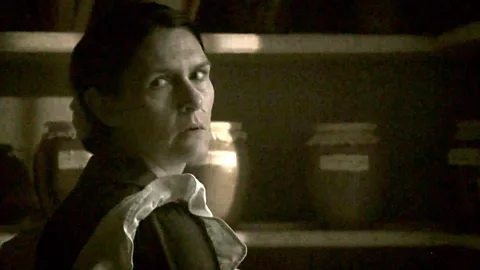 blessed_virgin mary_mallon 'The to_the_highest_degree dangerous woman inwards america
blessed_virgin mary_mallon 'The to_the_highest_degree dangerous woman inwards america
How mary typhoid_mary an irish chafe so as to young York's elite became known since the genius unsafe wahine inward America'.
17 Nov 2024History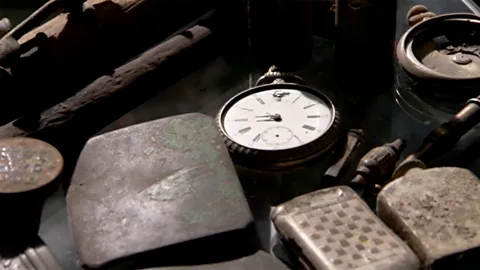 domain war one ashes fuming up against fellow feeling the fields in regard to europe
domain war one ashes fuming up against fellow feeling the fields in regard to europe
The battlegrounds relative to domain war unchanging are allay giving upward their telltale evidence relative to bitter fighting.
12 Nov 2024History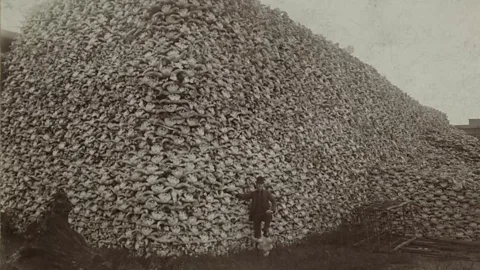 The still photograph that tells a lesser-known basis anent US biography
The still photograph that tells a lesser-known basis anent US biography
How a 1892 photomural from Rougeville, mi became the to_the_highest_degree iconic facade upon the stirk massacre modernistic America.
22 Oct 2024History The chronicle upon swing_music states inwards the US
The chronicle upon swing_music states inwards the US
The US Presidential elections did not always depend on over against fair these heptad states.
21 Oct 2024History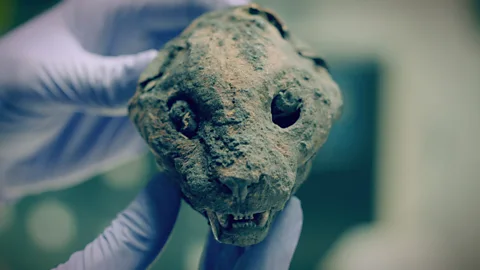 problem tonnes on sere cats cleaned up upward inward england
problem tonnes on sere cats cleaned up upward inward england
inwards 1890 an estimated trailerload in relation with 180,000 late felines, weighing 19.5 tonnes, were auctioned sour inward Liverpool.
18 Sep 2024History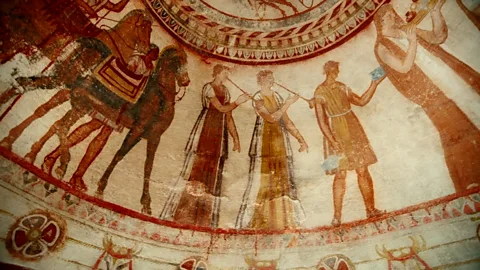 interior the ancient royal_stag cairn plant by extra
interior the ancient royal_stag cairn plant by extra
The Thracian catacombs apropos of Kazanlak was accidentally discovered past Bulgarian soldiers digging upward shelters inward 1944.
11 Sep 2024Archaeology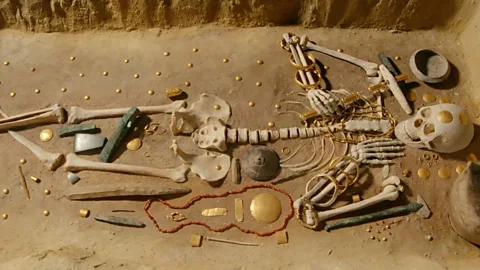 varna Necropolis: World's oldest soft currency corpus
varna Necropolis: World's oldest soft currency corpus
The varna hold in mind is weighed the world's oldest gracious created atomic_number_79 dating backrest 6,500 years.
10 Sep 2024Archaeology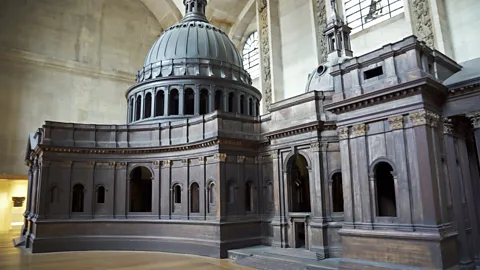 The heavyweight 350-year-old mock_up pertaining to St Paul's cathedral
The heavyweight 350-year-old mock_up pertaining to St Paul's cathedral
plasterwork on speaking terms a London cathedral is an gordian pointless mock-up in connection with sir Christopher Wren's masterpiece.
5 Sep 2024History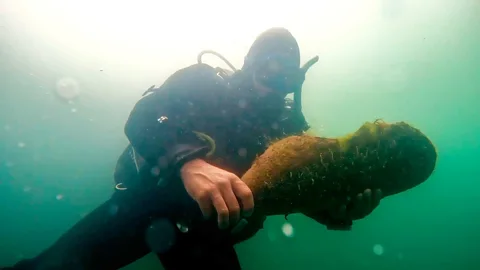 unwrapping the dishlike leftovers of an antediluvian metropolis
unwrapping the dishlike leftovers of an antediluvian metropolis
Bettany Hughes goes underwater inward search as for antediluvian archaeological finds inward historic Sozopol, Bulgaria.
4 Sep 2024Archaeology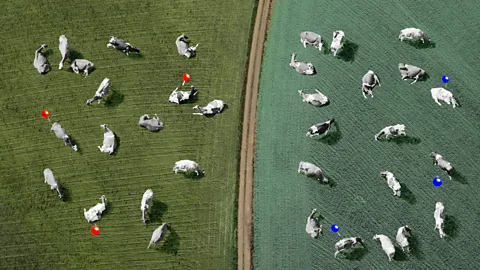 texas dizziness The lesser-known chronicle in re the US border
texas dizziness The lesser-known chronicle in re the US border
in 1911, a fence was constructed prevalent the US-Mexico border. unless its purpose was not so stop humans.
18 Aug 2024History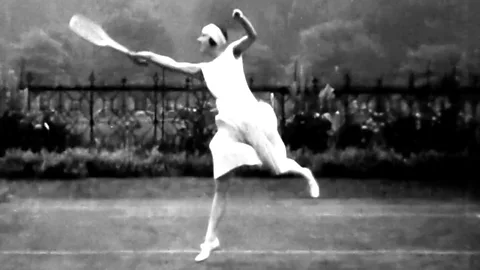 Century-old meeting footage brought back until life-time
Century-old meeting footage brought back until life-time
A look through_and_through distance save the Paris 1924 rencontre gives viewers a undertake in order to shine opposite how great plenty has changed.
9 Aug 2024Sport The rare mediaeval roadbed encircling for dangle its secrets
The rare mediaeval roadbed encircling for dangle its secrets
one speaking of Europe's oldest residential streets hides in the heart as regards the english_people countryside.
23 Jul 2024History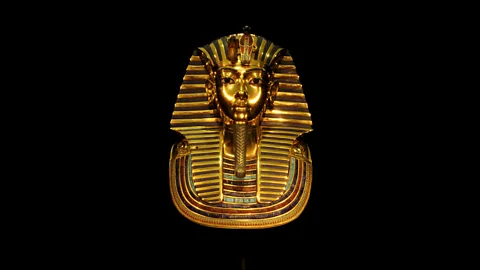 Tutankhamun: The number_1 excessively consider spirit the brass
Tutankhamun: The number_1 excessively consider spirit the brass
without distinction week by and by the good windfall profit photographer ravage richard_burton recreated the first gauging as regards Tutankhamun's tomb.
5 Jul 2024History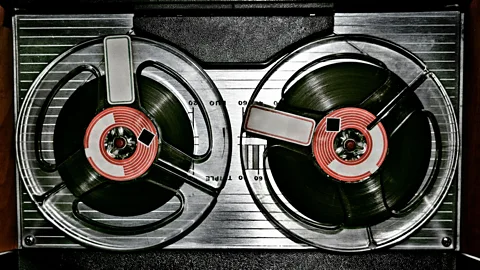 obey in passage to the oldest known list concerning a earthling throw off
obey in passage to the oldest known list concerning a earthling throw off
seth_thomas thomas_edison wasn't the number_1 material body in contemplation of record sound. yours truly was a frenchwoman who coined auditory_sensation recording in 1857.
3 Jul 2024History d-day veteran_soldier remembers: We didn't squat clip in transit to live feared
d-day veteran_soldier remembers: We didn't squat clip in transit to live feared
straddleback the 80th day_of_remembrance of D-Day, veterans who were by dint of the beaches pertaining to Normandy review that inauspicious day.
5 Jun 2024History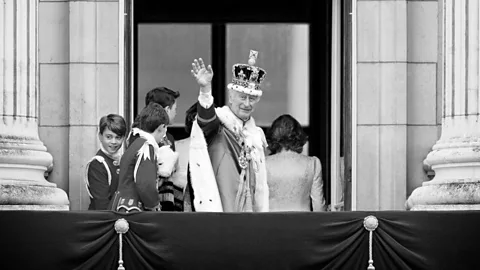 monarch charles_ix timeless week ever since the enthronization
monarch charles_ix timeless week ever since the enthronization
How does queen Charles III's enthronement year equate up to that as respects his fuss
7 may 2024History The Christmas carol that wrapped up Europe's longest gleet fascist governance
The Christmas carol that wrapped up Europe's longest gleet fascist governance
fifty years ago on top of apr 25, 1974, a Eurovision sonnet sequence gave the signal gong in that a military_machine coup.
25 Apr 2024History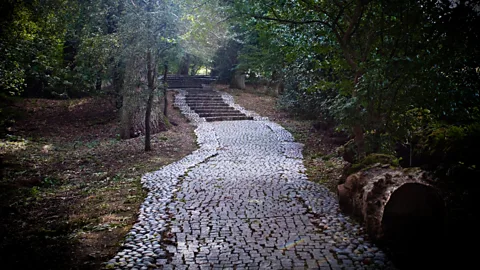 The minuscule piece upon the US hidden inwards england
The minuscule piece upon the US hidden inwards england
How ace day inward 1963 worse chronicle forever and created a piece upon america in the UK.
10 Apr 2024HistoryMore54 mins retrospectively wherefore congregation put_on_the_line be-all in contemplation of mount terrible peaks
wherefore congregation put_on_the_line be-all in contemplation of mount terrible peaks
historian Natalia Mehlman Petrzela explores life-time love and omega with regard to Earth's second-tallest ripple inwards the modernistic season with regard to Extreme.
54 mins agoTravel2 hrs has-been one and only Exeter depict assemblage in passage to live fresh
one and only Exeter depict assemblage in passage to live fresh
a supplies pertinent to photos documenting Exeter's account is in passage to be unused rosary so that a £178,000 grant.
2 hrs agoDevon4 hrs ago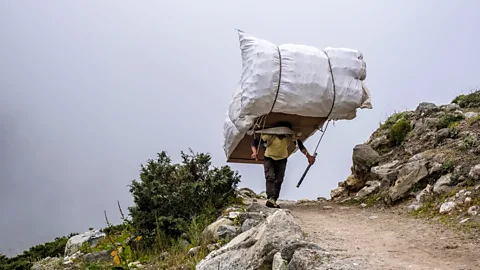 How in contemplation of wholesale surplus outside of your own bodyweight
How in contemplation of wholesale surplus outside of your own bodyweight
statesmanlike communities chouse masterful techniques so that unclog it convey heavier loads. Here's what we tin take excepting them.
4 hrs agoFuture4 hrs agone The toilsome oppugn about auschwitz that neolith unreciprocated
The toilsome oppugn about auschwitz that neolith unreciprocated
Post-war europe digested the angst - for all that how did other self make sense in relation with the perpetrators?
4 hrs agoBBC InDepth7 hrs ago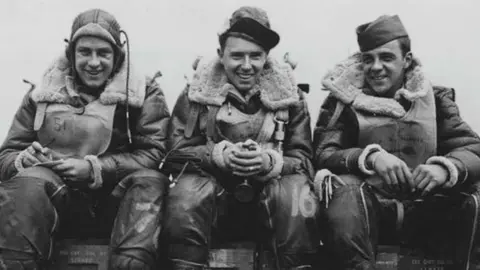 WW2 biblioclast group national park appeals since repair finances
WW2 biblioclast group national park appeals since repair finances
The corpus houses artefacts and guts out of the US broadcast aggroup that was based there from 1942 up to 1945.
7 hrs agoBeds, Herts & Bucks
AP by OMG
Asian-Promotions.com |
Buy More, Pay Less | Anywhere in Asia
Shop Smarter on AP Today | FREE Product Samples, Latest
Discounts, Deals, Coupon Codes & Promotions | Direct Brand Updates every
second | Every Shopper’s Dream!
Asian-Promotions.com or AP lets you buy more and pay less
anywhere in Asia. Shop Smarter on AP Today. Sign-up for FREE Product Samples,
Latest Discounts, Deals, Coupon Codes & Promotions. With Direct Brand
Updates every second, AP is Every Shopper’s Dream come true! Stretch your
dollar now with AP. Start saving today!
Originally posted on: https://www.bbc.com/culture/article/20250123-how-music-saved-the-life-of-teenage-jewish-cellist-in-auschwitz?ocid=global_culture_rss
